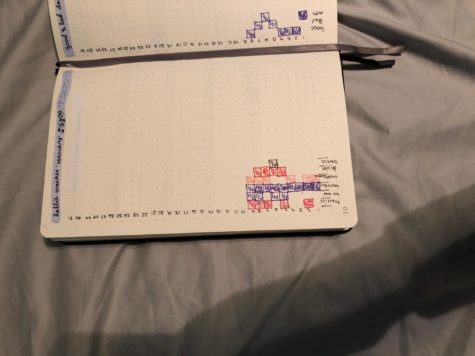Tips to keep your 2019 New Year’s Resolutions
Junior Jessica Rumsey cleans out her band locker as part of her New Year’s Resolution Jan. 8. Rumsey has decided that in the new year she is going to be more organized and is hoping to stick with it throughout the year.“My New Year’s Resolution is to stay more organized because I think it’s in my nature to be disorganized. I hope that my friends will help keep me honest, but I will keep up with my resolution mainly by making sure that I put things back once I am done using them,” Rumsey said.
January 11, 2019
People across the nation participate the trend of creating a New Year’s Resolution and have done so for hundreds of years. Yet, according to U.S. News, as much as 80% of the population gives up on their resolutions by the second week of February. Follow these few simple tips to learn how you can be successful in your resolutions this year.
Be Specific- It is important to make a concrete goal that is attainable but will push your limits. Instead of just stating that you want to lose weight, be more specific and say exactly how many pounds you want to lose and by when. Adding specific ways you will achieve your goal also makes is more effective.
Achievable- Your goal should not be so far-fetched that it is unattainable. So, set a goal that you know you can achieve within the year. For example, if you want to lose 30 pounds in one week, that may not be realistic, however one to two may be. As the year goes on and you fall into a routine, you can change your goals accordingly.
Keep track of your progress- While results will not come magically overnight, if you stay persistent with your goal, the results will be worth the work and time. It lets you know how far you have come and what more you can gain by sticking with your resolution.

Make a Routine- The New York Times suggests to create a plan. By answering these few questions, you can fix a bad habit and achieve your goals by first addressing the problem and figuring out how to solve it. Follow this easy template from The New York Times to help.
Bad habit: What habit do you want to change? Ex: I eat too much junk food throughout the week
High school bad habit: Eating too many Brenda’s cookies
Cue: How do you known that this habit needs to change? Why do you want to change it? Ex: I have gained weight and my skin is breaking out
High school cue: My lunch balance drains quickly
Reward: What does this bad habit do for you? Ex: I don’t have to cook at home and it is easy and fast
Highschool reward: Brenda’s cookies are yummy and a quick easy snack to eat in class
Way to change the behavior: What can you do to break this habit? Ex: I am going to go to the grocery store once a week and pick out healthier meals to cook at home
High school way to change the behavior: I am going to limit myself to two cookies a week




![Minutes before the Activities Fair in the gym, president Abhi Gowda ‘26 prepares the stall for his club Helping Hands, Sept. 4. A relatively new club, Helping Hands was co-started by Gowda and focuses on assisting the homeless, and just last year they succeeded in raising a couple hundred donations to send to shelters. This year, they have goals to expand, with hopes to increase volunteer opportunities and take in-person trips to shelters, as well as extend their help beyond just homeless people. “The Activities Fair gives a lot of underclassmen the opportunity to really get to know the Canyon culture, and it gives them many opportunities for service and volunteering,” Gowda said. “[Through the Activities Fair,] I hope to find a bunch of new and passionate members about our club and just get our name out there and spread awareness to the cause that we’re fighting for.”](https://rockmediaonline.org/wp-content/uploads/2025/09/1-2-1200x885.jpg)







![The winter guard team makes fifth place at the state championship finals in the Denver Coliseum, March 30. The team performed to Barnes Country's “Glitter and Gold,” lead by coaches Margo Sanford, Blair Bickerton and Anna Orgren. In their class there were a total of nine groups participating, and the top five who made it to finals received a plaque. “[Walking onto the stage] is very nerve-wracking, but also very exciting as well. When you first start color guard there's a lot of anxiety and uncertainty when you first perform in front of an audience, but once you've done it for a while, it starts to become the best part of the season,” Ella West ‘25 said. “It's very fulfilling to see an audience react to something you've put your heart and soul into.”](https://rockmediaonline.org/wp-content/uploads/2025/04/Both-socal-media-nd-website-main-1-1200x846.jpg)


![April marks the 25th anniversary of Sexual Assault Awareness Month, created by the National Sexual Violence Resource Center (NSVRC). This month is to spread awareness of the harassment, assault and abuse that happens around the world. The symbol that represented the month was a teal ribbon; however, some survivors of assault create different symbols and movements like the TikTok trend in 2022, where survivors would tattoo Medusa on their body, in honor of her backstory in Greek Mythology. “I don't think [this month is known] at all. I rarely see anybody talk about it. I rarely see much of an emphasis on posting it online, or much discussion about it, and I feel like there needs to be way more discussion,” an anonymous source said. “I think just validating every experience that a person has gone through, regardless of the degree of it, the severity, is an essential step into making sure that people are aware that this is a very real problem in a society and that we need to do better in addressing it.”](https://rockmediaonline.org/wp-content/uploads/2025/04/IMG_0011-1200x900.jpg)













![Lesbian Visibility Day is April 26, and it’s a holiday to celebrate the lesbian community of the world. Lesbian Visibility day was established in 2008 by many queer activists and organizations who sought to raise more awareness for lesbian history and culture. “So this is why during Lesbian Visibility [Day] we celebrate and center all lesbians, both cis and trans, while also showing solidarity with all LGBTQ+ women and nonbinary people,” Linda Reily, in an article written by her, said.](https://rockmediaonline.org/wp-content/uploads/2025/04/Lesbian-Visibility-day.jpeg)





